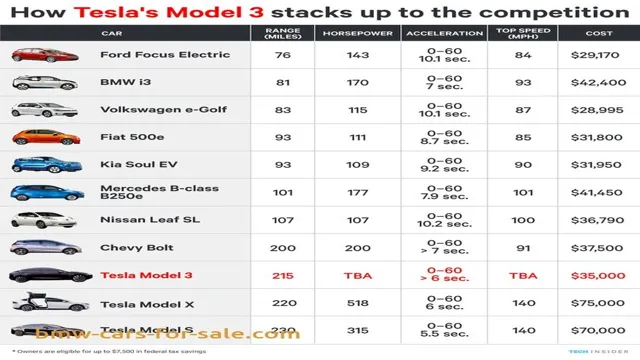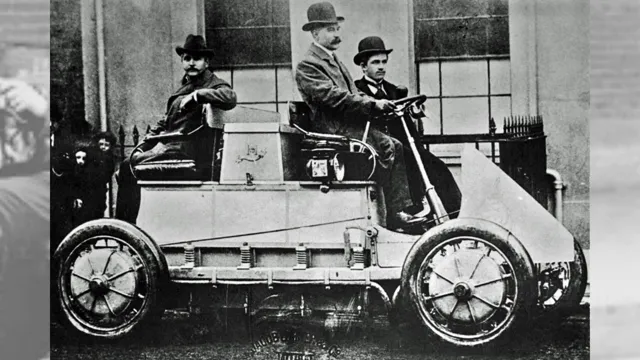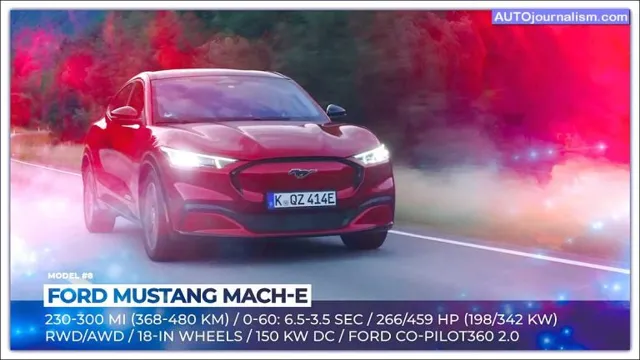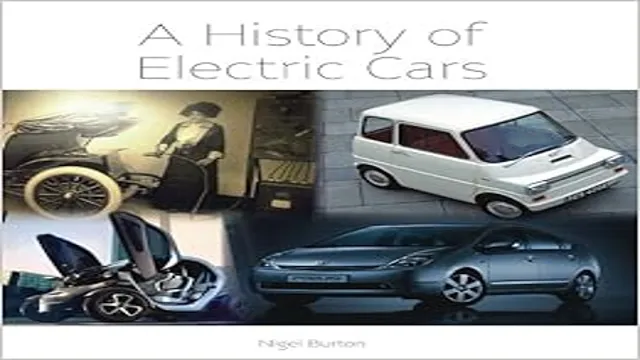Revving Up for the Electric Revolution: Exploring the Future of Electric Cars
Electric vehicles (EVs) have come a long way since their first appearance in the automotive industry. Initially considered impractical and far-fetched, electric cars have steadily gained popularity among consumers in recent years. In fact, the world is currently experiencing an EV boom.
An increasing number of people are making the switch to electric cars as they become more affordable and the driving range improves. With governments incentivizing EV ownership, their popularity is set to skyrocket in the coming years. But what exactly is behind this EV boom, and why is it happening now? In this blog post, we’ll take a closer look at the forces driving the rise of electric vehicles, and what the future holds for this exciting technology.
Rise of Electric Vehicles (EVs)
Electric cars are becoming the future of transportation as more people turn towards eco-friendly alternatives. In recent years, the rise of electric vehicles (EVs) has been rapid, with car manufacturers and governments investing heavily in this technology. One of the main drivers of this shift is the need to reduce carbon emissions and combat climate change.
EVs are also more efficient, require less maintenance, and have lower running costs than their gasoline counterparts. Battery technology has also improved, making EVs safer and more practical for day-to-day use. As charging infrastructure becomes more prevalent, EVs are becoming a more viable option for long-distance travel.
While the cost of purchasing an electric car is still a barrier for some, the price is expected to decrease as technology advances and more competition enters the market. With the demand for EVs on the rise, it’s clear that electric cars are the way of the future.
Government initiatives and subsidies driving change
As the world moves towards a more sustainable future, governments around the globe are initiating various subsidies to promote electric vehicles (EVs) and their infrastructure. EVs have gained immense popularity due to their low maintenance, zero-emission, and cost-effectiveness. In recent years, countries like Norway, China, and India have launched initiatives to encourage people to switch to EVs.
Norway, for instance, offers various incentives such as exemption from sales and road taxes, free public charging, and reduced ferry fares for EV owners. Similarly, in India, the government provides a subsidy of up to INR 1,50,000 for those purchasing an EV. These efforts have led to a significant increase in the adoption of EVs, which is expected to triple by 202
As the demand for EVs grows, automakers are ramping up production while investing in research and development to create more affordable and efficient models. With the increasing government support, the era of EVs is only going to accelerate in the coming years, providing a sustainable alternative to traditional fossil-fueled vehicles.

Consumers choosing sustainable options
The shift towards sustainability has led to a rise in electric vehicles. More consumers are choosing to drive EVs as they offer a cleaner and environmentally friendly alternative to traditional petrol or diesel cars. This shift has been accelerated with the advancement in technology and greater accessibility to charging stations.
The benefits of EVs not only include reduced emissions but also lower running costs and greater efficiency. With companies like Tesla leading the way in innovative design, EVs are becoming a popular choice for those looking to reduce their carbon footprint and make a positive impact on the environment. As a consumer, making the choice to switch to an electric vehicle is not only beneficial for the environment but can also save you money in the long run.
With the increased availability of charging stations and advances in technology, it is becoming easier than ever to make the switch to an EV. Are you ready to join the sustainable transportation revolution?
The EV market outlook
Electric cars are no longer a fad or a distant possibility – they’re fast becoming a reality on our roads. As more and more countries lay out ambitious plans to go electric by 2030, the future of electric cars is looking incredibly promising. It’s an exciting and transformative time, both for the automotive industry and society as a whole.
It’s not just a matter of reducing our carbon footprint, but electric cars are cheaper to operate and maintain in the long run, making them ideal for the financially savvy. However, the revolution hasn’t happened overnight – it’s taken years of research, experimentation, and investment to get to this point. There are still challenges to consider, such as range constraints, infrastructure issues in some areas of the world, and the higher upfront costs of electric cars compared to traditional fossil fuel vehicles.
Nevertheless, the future of electric cars is looking bright with a strong demand in the market and the continuous innovation being poured into making these vehicles more accessible to a wider audience.
Projected growth and market share
The EV market outlook seems to be very promising as electric vehicles gain greater popularity amongst consumers and governments worldwide. According to industry reports, the global electric vehicle market is expected to grow at a CAGR of over 22% from 2020 to 202 The increasing demand for electric vehicles is attributed to factors such as government incentives, environmental concerns, and advances in technology.
As electric vehicles become more affordable and accessible to consumers, it is expected that their market share will continue to grow. By 2030, it is predicted that over half of all new car sales will be electric, with China, Europe, and the United States leading the way. As a result, more and more automakers are investing in the development of electric vehicles to keep up with the growing demand.
Overall, the future of the EV market looks bright, and it is expected to become a significant player in the automotive industry.
Shifts in consumer behavior and preferences
Over the past few years, there has been a significant shift in consumer behavior and preferences, with more people now choosing to adopt sustainable and environmentally-friendly practices. This shift has had a profound impact on the automotive industry, particularly in the Electric Vehicle (EV) market. As more people become aware of the negative impact of traditional gasoline-powered vehicles on the environment, they are turning to EVs as a cleaner and more sustainable alternative.
This trend is expected to continue in the coming years, with the global EV market poised to experience significant growth. As governments around the world introduce policies and incentives to encourage the adoption of EVs, and as more automakers invest in research and development to create better and more affordable EV models, the future of the EV market looks bright. With improved technology and infrastructure, and with greater awareness and demand from consumers, EVs are set to become an integral part of the automotive landscape.
Innovations in battery technology
As EV adoption rates continue to rise rapidly, advancements in battery technology are becoming increasingly important. The future of the EV market depends largely on the development of more efficient, affordable, and sustainable batteries. One major innovation that shows promise is solid-state batteries.
These batteries replace the liquid electrolyte used in traditional lithium-ion batteries with a solid-state conductor, resulting in higher energy density and potentially longer lifespan. Other developments include lithium-sulfur batteries, which have the potential to be even more cost-effective and energy-dense than current lithium-ion batteries. However, these batteries are still in the prototype stage and need further testing before they can be commercialized.
Despite the challenges facing the industry, the outlook for the EV market is bright, as manufacturers and researchers continue to push the boundaries of battery technology to make more sustainable transportation options a reality.
The EV infrastructure challenge
The future of electric cars looks bright, but their success is dependent on the growth of the infrastructure that supports them. This task is proving to be a significant challenge for governments and businesses alike. The first hurdle is the need for sufficient charging stations, especially in areas that are less populated.
Increased investments in public and private charging stations are essential to address this issue. Another challenge lies in developing charging technology that can swiftly and efficiently recharge EVs in a short time. The current standard of charging takes about eight hours, whereas the goal is to reduce that to just half an hour or less.
Finally, the growth of EVs and the charging infrastructure means a more substantial demand for electricity from the grid. Businesses and governments will have to collaborate to ensure that this demand is addressed sustainably to avoid further environmental damage. Ultimately, addressing these challenges will lead to a future where electric cars become the norm and make our world a cleaner and more sustainable place.
Charging network expansion and challenges
One of the biggest challenges facing the adoption of electric vehicles (EVs) is the development of a robust EV charging infrastructure. While there has been considerable progress in expanding the charging network, there still remains significant work to be done. With more and more people opting for EVs, ensuring that they have access to convenient, reliable, and fast charging stations is critical.
However, the current infrastructure is fragmented and lacks standardization. This means that different charging stations can use different connectors or protocols, making it difficult for users to find a suitable charging station. Additionally, charging stations are not evenly distributed, with urban areas having more access than rural areas.
Furthermore, the high cost of building and maintaining charging stations is a significant barrier to expansion. While these challenges are daunting, the good news is that governments and private companies are actively working towards addressing them. By investing in the EV charging network, we can help accelerate the transition to clean energy and help build a better future for all.
Increasing demand for EV charging technology
The increasing demand for EV charging technology is proving to be a major challenge for the infrastructure to handle. As more and more people transition towards electric vehicles, we need to ensure that the charging infrastructure is able to support this growing demand. The current infrastructure is not sufficient to handle the influx of electric vehicles that are expected to hit the roads in the next few years.
While many companies and governments are investing in building new charging stations, it may not be enough to meet the demand. We need to find innovative ways to increase the charging efficiency of existing stations and develop new technologies that can handle the increasing demand. This requires a coordinated effort from all stakeholders to ensure that electric vehicle adoption goes hand in hand with the necessary infrastructure.
It’s not just about making it easier for people to charge their vehicles, but about creating a sustainable and efficient system that can support the growing number of electric vehicles on the road.
Conclusion: The future is electric
In conclusion, the future of electric cars is bright and electrifying. With advancements in technology and a shift towards sustainability, electric vehicles are becoming more accessible and practical for everyday use. The days of relying on fossil fuels for transportation are numbered, and the dawn of a new era of clean energy is upon us.
So, buckle up and get ready for a ride in the fast lane of the future, where electric cars reign supreme, emissions are a thing of the past, and the only sound coming from your vehicle is the hum of a powerful electric motor. It’s a future we can all get behind and one that will make the world a better, cleaner, and more sustainable place to live.”
FAQs
What is the current status of the electric car market?
The electric car market is continuously growing. According to reports, the sale of electric cars has increased by almost 60% in 2020.
How do electric cars affect the environment?
Electric cars are considered to be an environmentally friendly alternative to conventional cars as they produce fewer emissions. However, the production process of electric car batteries requires a substantial amount of energy, and the disposal of these batteries can cause pollution.
What is the range of an electric car?
The range of electric cars varies depending on the model and battery type. Some can go up to 400 kilometers on a single charge, while others have a range of only 100 kilometers.
Are electric cars expensive to maintain?
Electric cars do not require as much maintenance as conventional cars as they have fewer moving parts. However, the cost of replacing the battery can be high. On the other hand, electric cars have lower fuel costs and can save money in the long run.





